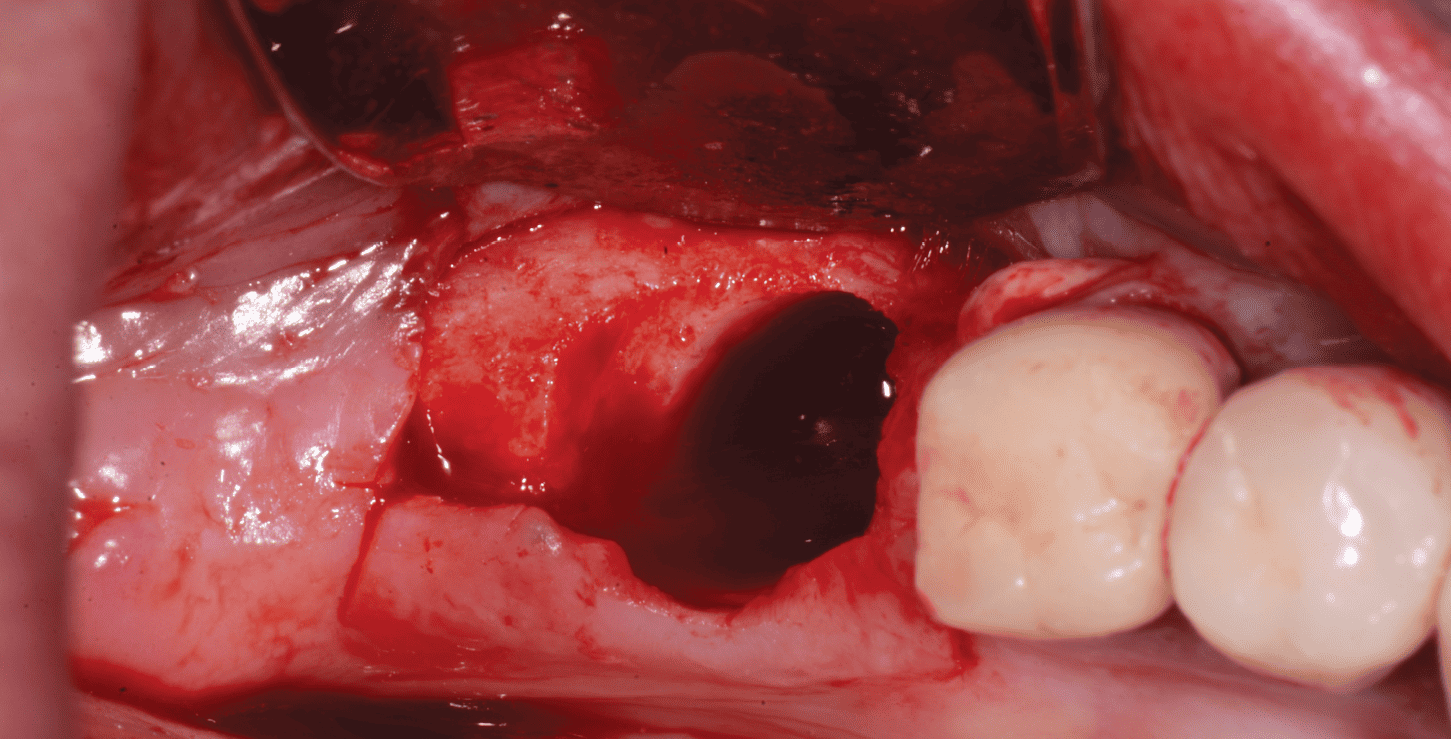Dr. Justin Moody reflects on how implant failures affect both the dentist and the patient
No one ever wants to hear the hygienist or the patient say, “Doctor, I think we have a problem with this implant,” yet if you place enough dental implants, you will indeed end up having this discussion. Complications and failures are part of the business and will happen to any dentist who places enough of them — the law of averages always wins. But why? We have taken all the precautions, are well educated, and the procedure went great, yet there is still an issue. If you really think about what we are asked to do with dental implants, it’s a small miracle that any of them survive. Being asked to place a cold piece of titanium metal into the dirtiest, most bacteria-infested part of the body, where motion occurs and foreign objects are placed all day long, is a lot to ask.

Figure 1: Vertical bone loss around a previously integrated dental implant — a number of factors may have contributed to the its failure and Figure 2: Uncovering the site reveals nearly complete fibrous tissue encapsulation of the dental implant

Figure 3: When an implant fails, it almost always takes good bone with it, leaving a defect that will need to be rebuilt and managed

Figure 4: No one likes to see the implant on the tray, but an understanding of why it happened will make it a valuable learning experience
I always tell my patients that although dental implants enjoy one of the highest success rates of any type of dental procedure, there is always the risk of complications and failure. How you handle these complications is your key to surviving the event and maintaining the positive relationship with the patient, but more importantly, we need to avoid giving implant dentistry a bad name. In my opinion, criticizing another dentist’s work when you see an issue is not only rude but also shameful; you have to believe that on that patient’s treatment day, the dentist was doing his/her very best. Will some patients just not understand? Yes, but in my experience, I have noticed that if you are honest with them and have a plan to resolve the issue, most will take comfort in that, and you may actually build more trust with the patient over how you handle the situation.
There are three keys to surviving implant failures — first is education. You need to have a solid understanding of the science and clinical procedures involved with good implant treatment. Second, you need to know your patient and the risk factors associated with this case. Many of our complications can be avoided by just getting to know the patient’s medical and dental history. And third, it’s about only setting realistic expectations. I am not necessarily talking about esthetics but about the fact that somehow the public has the perception that all dental work should last a lifetime, and if it doesn’t, they are upset and expect the resolution to be free of charge. Simply telling your patients that nothing in dentistry is forever can go a long way, especially if you plan to practice for 30 to 40 years.
Don’t let a dental implant failure derail your career. I have seen too many dentists back away from implant dentistry after having a negative outcome. Remember that we learn more from our failures than we ever do from our successes. Take a step back when something like this does occur, be a detective, find out what really went wrong, and then fix the situation in such a manner that you can lower the risk factors and get a good night’s sleep. Always do the right thing; it’s just that easy.
Stay Relevant With Implant Practice US
Join our email list for CE courses and webinars, articles and mores

 Justin Moody, DDS, DICOI, DABOI, is a Diplomate of the American Board of Oral Implantology and of the International Congress of Oral Implantologists, Fellow and Associate Fellow of the American Academy of Implant Dentistry, and Adjunct Professor at the University of Nebraska Medical College. He is an international speaker and is in private practice at The Dental Implant Center in Rapid City, South Dakota. He can be reached at
Justin Moody, DDS, DICOI, DABOI, is a Diplomate of the American Board of Oral Implantology and of the International Congress of Oral Implantologists, Fellow and Associate Fellow of the American Academy of Implant Dentistry, and Adjunct Professor at the University of Nebraska Medical College. He is an international speaker and is in private practice at The Dental Implant Center in Rapid City, South Dakota. He can be reached at 

